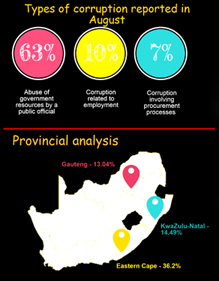|
Getting your Trinity Audio player ready...
|
The roles of principals and school governing bodies in managing a school are complex and appear to overlap, which can cause conflict. In this article we unpack what these two jobs actually entail and look at the different laws that apply to schools.
To give you an idea of where lines get blurred, consider a recent tip-off sent in to us by a concerned school employee:
“School funds were used without following budget, intercom was installed at school without involvement of school governing body, payments were made to educator who was not appointed by SGB because his boyfriend is teacher and friend of the principal … deputy principal was appointed unfairly because is the friend of the principal and secretary of SGB. School budget not presented to parents for adoption as expected for 2012 …”
While the South African Schools Act states that governing bodies are ultimately responsible for managing and controlling schools, it also states that principals – who are members of SGBs – are not solely accountable to the SGBs but also to their employer, the education department.
In order to reduce conflicts among a school’s various stakeholders, provincial education departments need to send out circulars regularly to clarify the laws governing the roles of principals.
According to the Schools Act, the roles of SGBs include the following:
- starting and administering a school fund;
- opening and maintaining one bank account for the school;
- preparing an annual budget and submitting it to parents for approval;
- drawing up and submitting audited or examined financial statements to their provincial departments of education;
- buying textbooks, educational material or equipment for the school;
- paying for services;
- supplementing the funds supplied by the education department (in the case of section 21 schools) by setting, collecting and administering school fees and also other fund-raising efforts; and
- deciding on applications for exemptions from school fees.
Their responsibilities also include administering, maintaining and controlling the school’s property, buildings and grounds; adopting a constitution; and deciding on whether the surrounding community can use the school for social purposes.
The Schools Act also makes provision for SGBs to apply for additional responsibilities, such as determining the subjects taught and an extra-mural curriculum.
More about principals
Principals, on the other hand, are responsible for supporting and providing assistance to the SGB, but they are also answerable to their employer, the education department. Principals therefore play a dual role.
Principals are expected to attend and participate in all SGB meetings and inform the SGB about policy and legislation. The principal is responsible for:
- supporting and guiding the school’s expenditure in consultation with the SGB;
- helping the SGB keep proper records of school accounts and all school records;
- overseeing the drawing up of the budget;
- advising on textbooks, educational material and equipment to be bought by the SGB and managing their use;
- ensuring controls are in place and operating for cash collection; and
- monitoring compliance and acting on any con-compliance detected.
Principals are also ultimately responsible for the school timetable, the admission and placement of learners, and all activities at a school that support teaching and learning.
According to the Education Laws Amendment Act, an additional responsibility of public school principals is to prepare an annual report on the academic performance of the school, and a breakdown of how the available resources have been used. Such reports must be submitted to the provincial education department every year.
Other laws that affect schools
- Public Finance Management Act:
Although the Public Finance Management Act (PFMA) has no direct bearing on schools, the Department of Basic Education applies certain sections of the PFMA to prescribe how schools should manage allocated funds from Treasury.
The Act is intended to regulate financial management in the national and provincial governments to ensure all revenue, expenditure, assets and liabilities of those governments are managed effectively and transparently.
- Circulars and policies issued by the provincial departments of education:
The national basic education department usually uses circulars and policies to inform principals and SGBs how the state’s allocation should be spent. Half of the state’s allocation is supposed to be spent on learning and teaching support materials, while the remaining half is spent on services rendered (including electricity and water), repairs and maintenance of schools. Principals are advised not to deviate from this.
Provincial education departments may issue further circulars prescribing further apportionments. For example, the KwaZulu-Natal education department dictates that 40% of a no-fee school’s learning and teacher support materials budget be spent on textbooks, 30% on stationery and 30% on classroom equipment.
The Western Cape education department has drawn up a policy setting out the rules of school governance. Titled Basic Financial System for Schools, the document lays out the roles and responsibilities of principals and school governing bodies. In addition, it gives guidelines on how to manage a school’s bank account and what to do when procuring goods, equipment and services for schools. It also gives tips on how to prevent fraud and corruption in schools.







